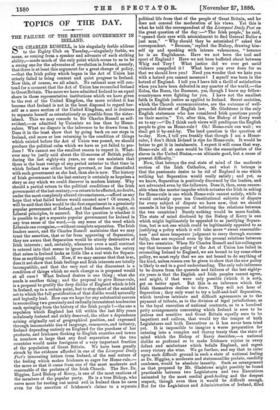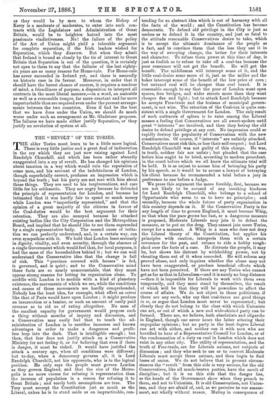TOPICS OF THE DAY.
THE FAILURE OF THE BRITISH GOVERNMENT IN IRELAND.
SIR CHARLES RUSSELL, in his singularly feeble address to the Eighty Club on Tuesday,—singularly feeble, we mean, as coming from a speaker and advocate of such striking ability,—made much of the only point which seems to us to be a strong one for the advocates of revolution in Ireland, namely, that there is at least this argument for a great change of policy, —that the Irish policy which began in the Act of Union has utterly failed to bring content and quiet progress to Ireland. Now this, of course, we all admit. No rational man will con- tend for a moment that the Act of Union has reconciled Ireland to GreatBritain. The more we have admitted Ireland to an equal share in those representative institutions which we have given to the rest of the United Kingdom, the more evident it has become that Ireland is not in the least disposed to regard her- self as a mere section of the United Kingdom, and is desirous to separate herself as ostentatiously as possible from the sister- island. This we may concede to Sir Charles Russell as self- evident,—as admitted by Unionists no less than by Home- rulers. What we dispute is the inference to be drawn from it. Does it in the least show that by going back on our steps in Ireland, and more or less returning to the condition of things which existed before the Act of Union was passed, we should produce the political calm which we have as yet failed to pro- duce ? We cannot see the smallest reason to expect it. What- ever may be justly said about the ill-success of British policy during the last eighty-six years, no one can maintain that there is the least vestige of any period anterior to that time in which Ireland was either better governed, or less dissatisfied with such government as she had, than she is now. The history of Irish government in the last century is certainly as hopeless a story as any which we could discover in modern history. Why should a partial return to the political conditions of the Irish government of the last century,—a return to be effected, no doubt, under the most completely altered circumstances,—afford us any hope that what failed before would succeed now ? Of course, it will be said that this would be the first experiment in a genuinely popular government of Ireland, and that therefore it ought, on Liberal principles, to succeed. But the question is whether it is possible to get a separate popular government for Ireland in any true sense of the word,—in any sense of the word which Liberals can recognise,—without complete separation. The Irish leaders assert, and Sir Charles Russell maintains that we may trust the assertion, that so far from approving of Separation, they are aware that Separation would be utterly destructive of Irish interests ; and, certainly, whenever even a mail contract is entered into that seems to ignore Irish interests, the outcry that arises in Ireland looks as little like a real wish for Separa- tion as anything could. Now, if we may assume that that is so, does it not show that Irish feelings and Irish interests are totally incompatible, and that the very root of the discontent is a condition of things which no such change as is proposed would at all cure ? What Ireland desires is one thing ; what she needs is another thing ; and the proposal to give Home-rule, is a proposal to gratify the deep dislike of England which is felt in Ireland, up to a certain point, but to stop short of the suicidal act to which the full gratification of that dislike would naturally and logically lead. How can we hope for any substantial success in reconciling two genuinely and radically inconsistent tendencies each springing from the history of the Irish people ?—the one a repulsion which England has till within the last fifty years sedulously fostered and richly deserved, the other a dependence arising originally out of geographical position, and expressed through innumerable ties of language, commerce, and industry, Ireland depending entirely on England for the purchase of her products, and Irishmen flocking to English counties and towns in numbers so large that any final separation of the two countries would make foreigners of a very important fraction of the population of Great Britain. We have been greatly struck by the evidence afforded in one of the Liverpool Daily Post's interesting letters from Ireland, of the real nature of the feeling which makes Irishmen so eager for Home-rule,- the more so that it came from one of the most moderate and reasonable of the prelates of the Irish Church. The Rev. Dr. Higgins, Lord Bishop of Kerry, is one of the most cautious of the members of the popular party. He is a true Bishop, who cares more for rooting out moral evil in Ireland than he cares even for the assertion of Irishmen's claims to a separate political life from that of the people of Great Britain, and he does not conceal the moderation of his views. Yet this is what he told the correspondent of the Liverpool Daily Post on the great question of the day :—" The Irish people," he said, "opened their eyes with astonishment to find General Buller a just man." "Why should they be astonished ?" asked the correspondent... "Because," replied the Bishop, drawing him- self up and speaking with intense vehemence, "because he is an Englishman. Have we not been the tool and sport of England ? Have we not been buffeted about between Whig and Tory ? What justice did we ever get until violence compelled it ? What have you ever done for us that we should love you? Need you wonder that we hate you with a hatred you cannot measure ? I myself was born in the hatred of England. I tell you I have felt a thrill of satisfaction when you have been defeated in any quarter of the world,—the Zulus, the Boers, the Burmese, yes, though I knew my fellow- countrymen were fighting for you. I have not the smallest faith in English justice as applied to Ireland. Secret societies, which the Church excommunicates, are the outcome of well- grounded distrust of English law. Mr. Gladstone is the only English statesman who has considered Irish questions purely on their merits." Yet, after this, the Bishop of Kerry went on to say :—" Do I think such views will predispose the English people to give us Home-rule ? Oh I Home-rule can wait ; we shall get it by-and-by. The land question is the question of to-day. Now, I tell you frankly that though I am a Home- ruler, I don't think Ireland is ripe for Home-rule. It would be better to get it in instalments. I expect it will come that way. Home-rule all at once would be like the emancipation of the slaves in the United States,—an ultimate good, but a cause of present difficulty."
Now, that betrays the real state of mind of the moderate section of the Irish Catholics, and what it betrays is that the passionate desire to be rid of England is one which nothing but Separation would really satisfy ; and yet, as we know, Separation is positively disowned by the leaders, and not advocated even by the followers. Does it, then seem reason- able when the master-impulse which actuates the then, in asking for Home-rule is one which Home-rule cannot satisfy, while it would certainly open ten Constitutional subjects of dispute for every subject of dispute we have now, that we should concede it for the purpose of bettering the relations between the two countries ? Surely nothing would be more foolish. The state of mind disclosed by the Bishop of Kerry is one which might legitimately be appealed to as justifying Separa- tion, but is not one which could be legitimately appealed to as justifying a policy which it will take more "sweet reasonable- ness" and more temperate judgment to carry through success- fully, than are required even by the present relations between the two countries. When Sir Charles Russell and his colleagues say that because the policy of the Act of Union has failed in reconciling Ireland to England, we are bound to try some other: policy, we must reply that we are not bound to do anything of the kind, unless reason can be given to show that the new policy is likely to end in a good understanding. The only safe inference to be drawn from the quarrels and failures of the last eighty- six years is that the English and Irish peoples cannot agree, and might, if that were only possible (which it is not), get on better apart. But this is an inference which the Irish themselves decline to draw. They will not hear of Separation' they only want to try a half-and-half Separation, which involves intricate and difficult agreements as to the payment of tribute, as to the division of legal jurisdictions, as to the loyal execution of national contracts, as to a hundred petty arrangements concerning which Ireland is sure to be jealous and sensitive and Great Britain equally sure to be impatient and callous, that would try the temper of both Legislatures and both Executives as it has never been tried yet. It is impossible to imagine a worse preparation for entering into a complex and thorny treaty than the state of mind which the Bishop of Kerry describes,—a national dislike so profound as to make Irishmen rejoice in every defeat and misfortune which befalls England, and regret every victory she wins. We go further, and say that to enter upon such difficult ground in such a state of national feeling as Dr. Higgins a moderate and statesmanlike prelate, candidly confesses, would be absolute insanity. Such an arrangement as that proposed by Mr. Gladstone might possibly be found practicable between two Legislatures and two Executives animated by the most cordial good-feeling and the deepest respect, though even then it would be difficult enough. But for the Legislature and Administration of Ireland, filled
as they would be by men to whom the Bishop of Kerry is a moderate of moderates, to enter into such con- trade with the Legislature and Administration of Great Britain, would be to heighten hatred into the most passionate vindictiveness. No! the failure of the policy of the Act of Union might yield a tolerable argument for complete separation, if the Irish leaders wished for Separation, which they disavow. But when they admit that Ireland is bound so closely by the tie of interest to Great Britain that Separation is out of the question, it is certainly not open to them to say that the failures of the last eighty- six years are so many reasons for Home-rule. For Home-rule has never succeeded in Ireland yet, and there is assuredly no historic case in its favour. Moreover, in order that it should have the barest chance of success, it requires a candour of mind, a friendliness of purpose, a disposition to interpret all contracts in the moat liberal manner,—in a word, an amicable as well as a reasonable temper, far more constant and far more imperturbable than are required even under the present arrange- ments between the two countries. Even if bad be the best that we have done under the Union, we should do much worse under such an arrangement as Mr. Gladstone proposes. The failures we have made either justify Separation, or they justify no revolution of system at all.







































 Previous page
Previous page